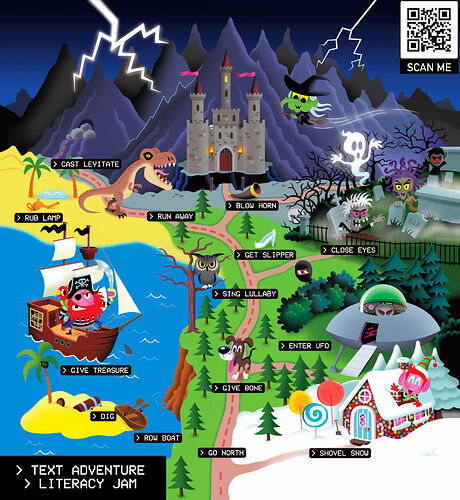Announcing the Text Adventure Literacy Jam.
The theme of the jam is to “Create a TEXT ADVENTURE game suitable for children with no prior experience”.
Whilst games that offer an in game tutorial are nothing new, many of these games are still not suitable for absolute beginners to the genre, or even if they are, they are difficult to find.
The concept for this jam has been brewing for almost a year. This is the sixth Adventuron gamejam with all previous jams inviting newcomers to coding to code their own text adventure games. This jam is different in that it invites experts (or determined amateurs) to code a parser game for children.
Making these games accessible is the purpose of this jam. Until there is a younger audience for parser games, then the community is destined to die out, This is the first “Adventuron” jam that does not have an “Adventuron only” system requirement.
The jam as usual has a variety of prizes, including a Raspberry Pi 400, a Raspberry Pi 4, a Raspberry Pi Pico, a printed edition of Classic Adventurer magazine, as well as Pico-8 licenses. More prizes may be added before the end.
Thank you for the sponsors and if you feel like you would like to sponsor the jam somehow, mail info@adventuron.io .The only rule for sponsorship is that you cannot add a system specific prize, all prizes must be placed in the placement or the participation prize pools.
The jam itself is opinionated, and perhaps that will put a lot of people off from entering.
The purpose is to make a set of rules to avoid design pitfalls that seem to plague beginner players.
Games are required to have at least 6 locations, 6 puzzles, 6 objects, and an interactive tutorial that guides the player through concepts such as getting an object, dropping an object, checking inventory, examining an object, compass movements, and solving initial puzzle(s). Help and hints throughout a good portion of the game are encouraged, as are optional cheetsheets.
Brevity is the order of the day with locations allowing a maximum of two sentences to describe themselves, and responses being similarly limited.
The parser for the purpose of the jam is limited to VERB NOUN, and only rational directions are permitted (no diagonals or unidirectional connections, except for blocks).
SEARCH and EXAMINE must be synonyms, and all nouns must have a custom EXAMINE response
Making a game with graphics is encouraged, but it is not required. It is expected that children expect some level of graphical presentation, even if simple, but this rule is relaxed for the sake of perhaps using the jam to make a fast paced text only game instead.
More design rules are described on the jam page itself, but they all serve to reduce new player friction, at a cost of course of author freedom.
A full rules are available at this link here ( Text Adventure Literacy Jam - itch.io ).
Source code for the TALP version of Excalibur is provided to provide information on the design and implementation of an interactive tutorial.
It is strongly encouraged that games are playable in the browser, but this is not a requirement.
The judging methodology is not yet announced and discussions with possible judges are underway.
Having parent/child judges is not something I’ve ruled out - because after all - the jam is targeting younger players. I’ve asked a number of community figures to consider being judges too, but it’s too early to announce a panel yet.
Using the TALP suffix in conjunction with TEXT ADVENTURE in a Google search should be able to find many games that are beginner level, and assume no prior knowledge.
The goal with this jam is to win a new audience, an audience of the joyful variety. To do this the author burden must be increased unfortunately. I do hope this doesn’t put off people from joining in.
Chris
NOTE: There will be no summertime jam this year in order to make way for ParserComp 2.0.


